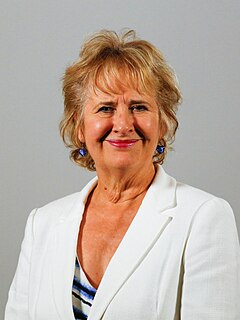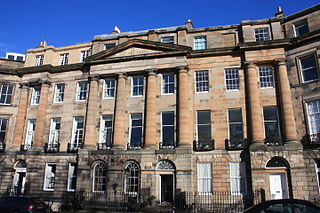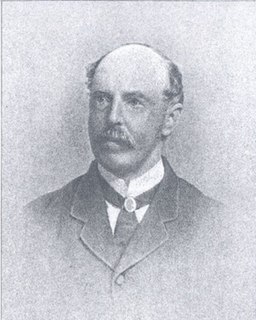Related Research Articles

Roseanna Cunningham is a retired Scottish National Party (SNP) politician who served as Cabinet Secretary for Environment, Climate Change and Land Reform from 2016 to 2021. She was previously Cabinet Secretary for Fair Work, Skills and Training from 2014 until 2016.

John Row was a Scottish ecclesiastical historian and one of the Scottish Reformers. As minister of Carnock in Fife, he was a leading opponent of Episcopacy. Row's Historie of the Kirk of Scotland (1558–1637), left by him in manuscript, is an original authority for the period. An account of his life is attached to the work.
Andrew Bruce Cameron is a Scottish Anglican bishop who served as the Bishop of Aberdeen and Orkney and the Primus of the Scottish Episcopal Church.

James Scott was a Scottish lawyer and Liberal Party politician.

John Mylne of Perth was a Scottish master mason who served as Master Mason to the Crown of Scotland. He was born in Perth, the son of John Mylne, also a master mason, and Helen Kenneries.
David Greig is a Scottish playwright and theatre director. His work has been performed at many of the major theatres in Britain, including the Traverse Theatre, Royal Court Theatre, Royal National Theatre, Royal Lyceum Theatre and the Royal Shakespeare Company, and been produced around the world.

Caledonia Reds were a Scottish rugby union professional district team who participated in the Scottish Inter-District Championship and in two seasons of the Heineken Cup. They evolved from one of the traditional four amateur districts of Scotland, North and Midlands, in 1996.

Sir Robert Pullar was a Scottish Liberal Party politician in the United Kingdom.
Events from the year 2002 in Scotland.
Events from the year 1943 in Scotland.
Andrew John Smith Greig was a Scottish footballer who played as a goalkeeper in the Scottish Football League for Aberdeen and in the Football League for Darlington either side of the First World War. He also played for Mugiemoss, Raith Rovers, Shildon, Peterhead and Montrose. He was deaf.
William Mitchell KC was a Scottish advocate and Liberal Party politician. He was Sheriff-substitute of Selkirkshire.
David Middleton Greig FRSE FRCSE LLD TD was a Scottish surgeon who worked for most of his career at Dundee Royal Infirmary. He developed an interest in diseases of bone and came to be regarded as an international authority on the subject. He wrote numerous papers on skeletal abnormalities and Greig cephalopolysyndactyly syndrome is named after him. Over the course of his career he amassed a large collection of skulls demonstrating various bony abnormalities. After retiring from surgical practice he became conservator of the Museum of the Royal College of Surgeons of Edinburgh at Surgeons' Hall. He donated 250 skulls to Surgeons' Hall Museum, where some remain on display as part of the Greig Collection.
Sir Robert Blyth Greig was a Scottish agriculturalist. He served as Chairman of the Scottish Board of Agriculture from 1921 to 1928 and was Secretary to the Department of Agriculture for all Great Britain from 1928 to 1934.

Prof William Pirrie FRSE LLD was a 19th-century Scottish surgeon and medical author. He served as President of the North of Scotland Medical Association.

Amy Sanderson née Reid (1876-1931), was a Scottish suffragette, national executive committee member of the Women's Freedom League, who was imprisoned twice. She was key speaker at the 1912 Hyde Park women's rally, after marching from Edinburgh to London, and, with Charlotte Despard and Teresa Billington-Greig, was a British delegate to the 1908 and 1923 international women's congresses.
John Row, born 1598, was the second son of John Row, minister of Carnock, and grandson of John Row, the Reformer. He educated at University of St Andrews graduating with an M.A. in 1617. He was elected schoolmaster of Kirkcaldy 2 November 1619, resigning before 25 November 1628. He was licensed by the Presbytery of Dalkeith 29 September 1631 and became tutor to George Hay, afterwards second Earl of Kinnoul, by whose father, the Lord Chancellor's recommendation, he was appointed master of the Grammar School of Perth in June 1632. He was ordained to Third Charge, Aberdeen, 14 December 1641 and appointed on 23rd November 1642 as lecturer on Hebrew in Marischal College. He was so actively engaged in support of the Covenanting party that on the approach of Montrose to Aberdeen in 1646 he was compelled to take refuge in Dunnottar Castle. Row was appointed by the General Assembly in 1647 to revise the new version of the Psalms from 90 to 120. He was a member of the Commission of Assembly in 1648, and of Commission for visiting the University of Aberdeen 31 July 1649. John Row joined the Independents and was admitted to a church of that persuasion in Edinburgh. He was promoted to Principalship of King's College in Aberdeen in September 1652. He resigned in 1661, and thereafter kept a school in Aberdeen. He died at the manse of Kinellar in October 1672 and was buried at Kinellar.
Andrew Duncan was a Latin scholar and Church of Scotland minister at Crail. He achieved notoriety for his presbyterian principles which brought him into conflict with James VI who wished to impose an episcopalian system. He attended the General Assembly of Aberdeen in 1605 which had been proscribed or prorogued by royal authority and was one of six ministers who were imprisoned and later exiled as a result. He was allowed to return after several years in France but was subsequently banished again following further controversy in failing to comply with the Five Articles of Perth. He died in exile in Berwick-upon-Tweed in 1626.

Andrew Heiton was a Scottish architect. He designed several notable buildings in Scotland, mostly railway stations and country houses.